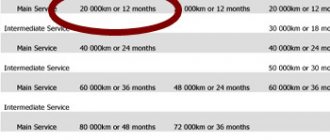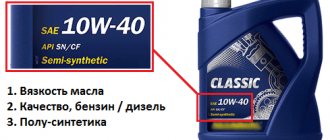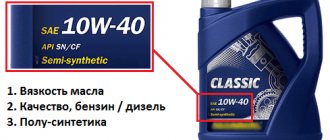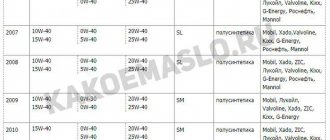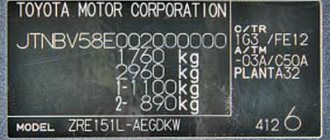Japanese cars are popular among domestic motorists due to their increased reliability and attractive design. However, not all users know what oil to fill in Toyota Auris after purchasing a used car. This in 90% of cases is due to the lack of service documentation or its loss after resale. Our editors have collected information about the company's regulations and factory recommendations for a specific car model.
Toyota Auris engine oil
The manufacturer recommends using Toyota branded lubricants for warranty and post-warranty vehicle maintenance. At the same time, SAE 0W20 or 5W30 tolerances are relevant for the climatic zone of the Russian Federation. Also, according to the service documentation, filling with 10W30 is allowed, however, at the next replacement, it is necessary to fill in the required standard.
In the absence of an original product or the unavailability of service centers, users often resort to selecting analogues from third-party companies. The choice of oil for the Toyota Auris engine is carried out according to the following criteria.
The basis
In 2021, there are three types of motor oil bases.
- Mineral water. The oldest and most ineffective category. It has a minimal cost and is not used in this car.
- Semi-synthetic. The most common variety due to the optimal price-quality ratio. Use is permitted only in cases specified by the factory.
- Synthetics. Representative of modern liquids. It is distinguished by increased protective characteristics and long service life. Users consider the high cost to be a disadvantage. This category is the only one recommended for the Toyota Auris model.
SAE
Regarding viscosity characteristics, car oil for Toyota Auris must comply with the following categories:
- 0W20;
- 5W30;
- 10W30.
The use of other types is not allowed.
API
Toyota Auris factory regulations require the use of SL/SM type fluids. Lubricants are distinguished by increased requirements for environmental friendliness of exhaust and protection of the power plant.
For diesel engines, SF-4 approval is relevant. These formulas help reduce fuel consumption and are compatible with particulate filter systems and other exhaust cleaning devices. Additionally, additive fillers reduce the natural waste of the lubricant and protect the piston rings from soot and deposits.
ACEA
The requirement is also relevant exclusively for Toyota Auris diesels. Tolerance B1 characterizes low-viscosity lubricants with high shear resistance and an extended service interval. Allowed for use only in cases where it is recommended by the factory.
Engine oil for Toyota Auris 1.6
It is recommended to use motor oil in a 1.6 engine according to the same tolerances. The information described at the beginning of the article is also relevant for this motor. To summarize, original oils are excellent options:
- Toyota Engine Oil SN 0 W-30;
- Toyota Motor Oil SN 0 W-20;
More versatile products you can use:
- Toyota Motor Oil SN GF-5 5 W-30
Analogs for Toyota Auris engines
As similar products, users often prefer the following varieties:
- Mazda Original Oil Ultra;
- Toyota/Lexus/Daihatsu Fuel Economy;
- Total Quartz Ineo MC3;
- Shell Helix HX8 Synthetic;
- ZIC X7 Diesel;
- Shell Helix Ultra ECT C3;
- Motul 8100 Eco-Nergy;
- ZIC X9;
- Comma Xtech;
- Castrol EDGE Professional OE Titanium FST;
- Total Quartz 9000 Future NFC;
- Kroon Oil Presteza MSP.
Note! These products are provided for illustrative purposes only. The final selection of oil depends solely on the personal preferences of the motorist.
How to check the oil level?
It is recommended to check the engine oil level every 1,000 km. Especially on older cars, the problem of oil leakage is quite pressing.
To carry out the procedure correctly, you must warm up the engine to operating temperature, and if after a trip, wait 5-10 minutes and remove the dipstick. The oil level should be between MIN and MAX.
Video instruction
How often to change oil in Toyota Auris
For the Toyota Auris power plant, a mileage of 10,000 km is considered optimal. However, under severe operating conditions, the service interval must be reduced to 8000-9000 km.
In the case of gearboxes, automatic transmissions are serviced at least once every 40,000 km, and automatic transmissions - 60,000 km. At the same time, the actual volume of lubricant is checked after each engine maintenance.
Also inside the service documentation it is stated that a complete replacement of the lubricant should be carried out after each repair or if extraneous sounds or structural defects are detected.
How much oil is in a Toyota Auris (Yaris) engine?
How many liters should I fill?
The volume of the engine lubrication system can be found in the operating instructions. According to the technical documentation, the lubricant filling standards are:
- engine oil 1.6 (4ZZ-FE,1ZR-FE) – 4.7 l;
- engine oil 1.3 (1NR-FE) – 3.4 l;
Tip: We recommend that you always keep a small amount of engine oil in reserve, since during the operation of the vehicle it may be necessary to add fluid to the internal combustion engine.
Oil consumption in the Auris 1.6 1ZR-FE engine
Over time, many cars begin to “eat” oil, and in fairly significant proportions. It can reach up to several liters per 1,000 km., mileage.
Toyota Auris car engine - how much oil to fill
First generation (E150, model year – 2006-2012)
Despite the platform from the four-door Corolla, the five-door Auris of the first generation had a completely original appearance, made in a youthful and sporty style. However, in technical terms, the model was no different from the sedan, given the similar set of engines. Thus, the car was delivered to Russia with gasoline internal combustion engines of 1.4 and 1.6 liters (97-124 hp), as well as 1.8 liters (147 hp, since 2009). As for the gearbox, initially a 5-speed manual and a 4-speed automatic were available, and in 2009 a 6-speed automatic appeared specifically for the 1.8 liter engine.
After the next restyling in 2010, a new basic configuration appeared with a 1.3 liter engine (101 hp) and a six-speed manual transmission. Aspirated 1.6 l VVT-i with a capacity of 124 hp. With. from now on it was available with a 4-speed automatic transmission, and the more modern 1.6 Valvematic with a power of 132 hp. With. Compatible with manual transmission only. Engines 1.4 and 1.8 were abolished. In Europe, the first generation Auris was still equipped with 1.4, 2.0, and 2.2 liter diesel engines (90-177 hp), as well as a hybrid power plant based on an electric motor and a 1.8 engine, borrowed from the Toyota Prius.
What is the replacement interval?
Changing the Toyota Yaris oil is an important technical undertaking that cannot be ignored. For a car engine, the optimal mileage is 10 thousand km. This is the manufacturer's recommended period for replacing the lubricant. The service interval should be reduced to 5-7 thousand km if the car is operated in harsh conditions.
How often should you change the oil in a Toyota Auris automatic transmission to avoid major repairs?
How much oil does a Toyota Auris require?
Let us consider in detail the required oil volume for all generations of the Toyota Auris.
Generation 1 (2007-2012)
- For engine 1.3 101 l. With. (gasoline, manual, model year – 2009-2012) the required oil volume is 3.4 liters.
- For engine 1.4 97 l. With. (gasoline, manual, model year – 2007-2009) the required oil volume is 3.7 liters.
- For engine 1.6 124 l. With. (gasoline, manual, model year – 2010-2012) the required oil volume is 4.2 liters.
- For engine 1.6 124 l. With. (gasoline, manual/robot/automatic, model year – 2007-2012) the required oil volume is 4.2 liters.
- For engine 1.6 132 l. With. (gasoline, manual/robot, model year – 2009-2012) the required oil volume is 4.2 liters.
- For engine 1.8 147 l. With. (gasoline, manual, model year – 2009-2010) the required oil volume is 4.2 liters.
Generation 2 (2012-2016)
- For engine 1.3 101 l. With. (gasoline, manual, model year – 2012-2013) the required oil volume is 3.4 liters.
- For engine 1.3 99 l. With. (gasoline, manual, model year – 2013-2016) the required oil volume is 3.4 liters.
- For engine 1.6 124 l. With. (gasoline, automatic, model year – 2012-2013) the required oil volume is 4.2 liters.
- For engine 1.6 132 l. With. (gasoline, manual/automatic, model year – 2012-2016) the required oil volume is 4.2 liters.
What kind of oil should be poured into the Toyota Auris engine
Original
For Toyota Auris, the original Toyota Engine Oil SN 0W-30 or Toyota Motor Oil SN 0W-20 fluid is recommended. Oil viscosity depends on ambient temperature conditions. For example, it is mainly recommended to use SAE 20W-40 or 25W-50 in summer, and in winter it is better to choose 0W-40, 0W-30 or 5W-30. If the car is driven all year round, then the manufacturer recommends all-season oil 10W-40, 10W-30 or 5W-40.
Unoriginal
Owners of old and used Auris cars of previous generations prefer alternative engine oils Shell, Kixx, Motul, Castrol, etc. In addition, in the product characteristics, you need to pay attention to the API tolerance parameters depending on the type of engine, as well as the year of manufacture of the car. Below are the optimal oil characteristics.
- First generation (2006-2012): for gasoline cars produced in 2006. mineral water or semi-synthetic water with a viscosity of 10W-40 or 5W-40, as well as API-SH approval, is suitable. For 2011 models. you should choose semi-synthetic API-SL.
- Second generation: for gasoline models 2012. semi-synthetic API-SM with a viscosity of 10W-40 or 0W-40 is suitable, and cars 2016 and later require semi-synthetic or synthetic API-SM or API-SN. Below are the best options for analogue motor oils for Toyota Auris.
- Petro-Canada Supreme Synthetic 0W-20
- Motul 8100 Eco-Clean 0W-30
- Mobil Full Synthetic 5w-30
What oil should I fill? — Toyota Auris, 1.6 l., 2008 on DRIVE2
I like one copy-paste that actually explains everything: “More precisely, I would say, some engine elements are designed for certain parameters (viscosity and chemical-thermal) of the engine oil available for a given manufacturer.
I can give an example of what results from using an oil that is not suitable for viscosity and heat resistance. Honda K20A VTEC engine. The timing drive is a chain drive with a hydraulic tensioner.
The manufacturer recommends engine oil of at least API SM standard with a viscosity of 0W20; as a short-term replacement, it is allowed to use API SM engine oil with a viscosity of 5W30 during the hot season.
The mileage on the engine is about 110 thousand km. There were no overheats.
On the recommendation of highly professional employees of one local car service center, the owner switched to using synthetic motor oil from the renowned European manufacturer API SL with a viscosity of 5W40.
The service technicians motivated this with the following considerations: your engine is already old (this is for a Honda K20A with a mileage of 100 thousand!, where the replacement of the timing drive is regulated only at 250 thousand km) - it’s wrong.
Apparently the guys have never seen Honda VTEC clutches, VTEC and VTC valves and their hydraulic tensioners, and how they work and what they are driven by is even more vague than I am. :unknw:
The engine took the first replacement and didn’t notice, except that the fuel consumption increased a little, which was written off for the cold season. On the second, minor problems began - oil burning, increased fuel consumption, decreased traction.
On the third replacement, quite noticeable problems began - the VTEC clutch clicked, the valves began to jingle during throttle changes and during active acceleration under load, the timing chain began to make noise, and a VTC valve error began to appear periodically, which eventually came out completely and did not disappear. The car stopped driving.
At all. The 156 horsepower Honda acquired the dynamic characteristics of a carburetor nine. :sorry:
The engine was opened. As a result: the VTEC and VTC valves were replaced, the VTEC coupling was washed and brought into working condition, the timing drive (chain, sprockets, dampers and hydraulic tensioner) was replaced. All the thin channels through which engine oil must flow, ensuring the operation of control valves, clutches and hydraulic tensioners, are completely overgrown with ash and bitumen deposits. Why?
- My vision is this: oil of excessive viscosity fit “very tightly” into these thin channels, the flow rate was clearly lower than calculated, local stagnation and overheating probably occurred, and since the oil did not also have the required oxidation resistance, it burned dully and the products of this combustion the channels of the coupling and control valves gradually became clogged.”
- Therefore, the second index is preferable to 20.
Source: https://www.drive2.ru/l/4499474/
What oil is required for Toyota Auris
Below is current information on oil parameters for the entire Toyota Auris engine range, depending on the generation and year of manufacture of the car.
Generation 1 (2007-2012)
- SAE classification for 1.3 101 liter engine. With. (gasoline, manual, model year – 2009-2012) – 0W-20, 5W-30.
- SAE classification for 1.4 97 hp engine. With. (gasoline, manual, model year – 2007-2009) – 5W-30, 10W-30.
- SAE classification for 1.6 124 hp engine. With. (gasoline, manual, model year – 2010-2012) – 10W-30, 5W-30, 5W-20, 0W-20.
- SAE classification for 1.6 124 hp engine. With. (gasoline, manual/robot/automatic, model year – 2007-2012) – 0W-20, 5W-30, 5W-20.
- SAE classification for 1.6 132 hp engine. With. (gasoline, manual/robot, year of manufacture – 2009-2012) – 10W-30, 5W-30, 5W-20, 0W-20.
- SAE classification for 1.8 147 hp engine. With. (gasoline, manual, model year – 2009-2010) – 0W-20, 5W-30.


